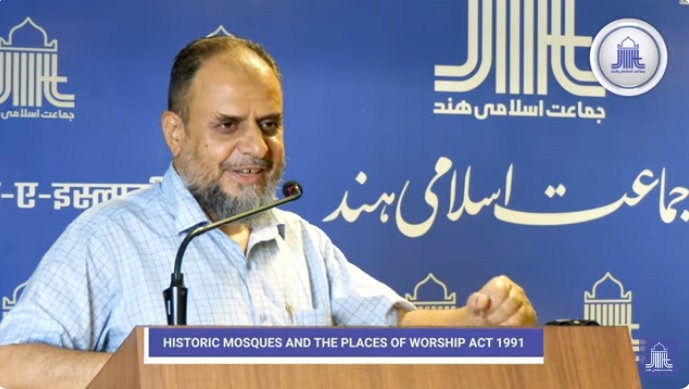New Delhi, Aug 21: Prof. Afzal Wani, former Vice Chancellor of IILM University in Gurugram and ex-member of the Law Commission of India, has advocated for the formation of a task force dedicated to documenting Islamic sites across the country. In a recent address at Jamaat-e-Islami Hind’s headquarters, Prof. Wani emphasized the need for the Muslim community to adopt corporate strategies to effectively represent their interests in the media, particularly in safeguarding historic mosques under threat in India.
During his speech, Prof. Wani delved into the intricacies of the “Historic Mosques and the Places of Worship Act 1991,” highlighting the need for a more strategic and intellectually sound approach to protect these religious institutions. He expressed deep concern over the undermining of legal protections provided by the Act, which was enacted to preserve the religious character of places of worship as they existed on August 15, 1947.
Prof. Wani pointed out the limitations of the Act, cautioning that while the law aims to maintain the religious status of worship sites, it is not a complete safeguard. He stressed that the Muslim community must actively prepare for the law’s effective implementation, warning that the mere existence of the law is insufficient if the community lacks the capacity to uphold it.
Drawing attention to recent legal challenges against prominent mosques, including the Gyanvapi Masjid in Varanasi and the Shahi Idgah Masjid in Mathura, Prof. Wani noted that loopholes in the 1991 Act, such as exemptions for ancient monuments and archaeological sites, have been exploited to undermine the law’s intent. He argued that these tactics are being used to create evidence against the protection of these mosques.
Prof. Wani also touched upon the Babri Masjid case, stressing that the Supreme Court’s judgment clarified that the mosque was not built after demolishing a temple. He urged the Muslim community to actively highlight this fact and to question the fairness of the court’s decision to allocate an alternative plot of land for a new mosque instead of restoring the Babri Masjid at its original site.
To counter these ongoing challenges, Prof. Wani proposed the formation of a task force to document the historical evidence of mosques and other Islamic sites, reinforcing their status through comprehensive records and legal documentation. He emphasized the importance of organizational skills and corporatization within the Muslim community to effectively manage these efforts.
In addition, Prof. Wani criticized the recent Waqf Amendment Bill, which allows non-Muslims to be members and CEOs of Waqf boards, arguing that such institutions should remain under the control of Muslims. He also highlighted the significant yet often overlooked influence of Islamic jurisprudence on Western legal systems, urging the community to be more proactive in showcasing these contributions.
Prof. Wani concluded by urging the Muslim community to understand the sensitivity of these issues and to act promptly to protect their religious institutions. “If the right decision isn’t made in time, others will take advantage,” he warned, calling for a comprehensive understanding of the strengths and weaknesses of current laws and rules regarding mosques.




